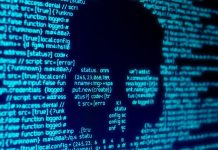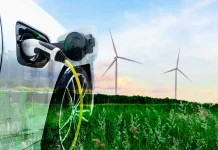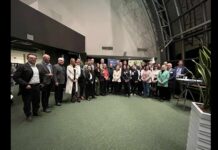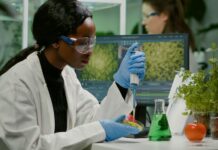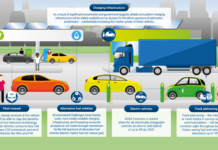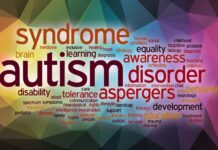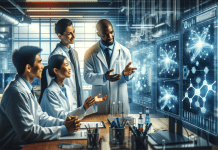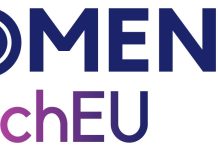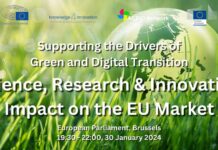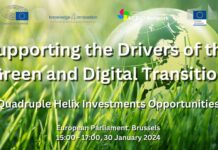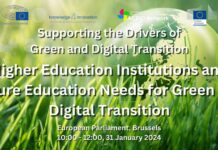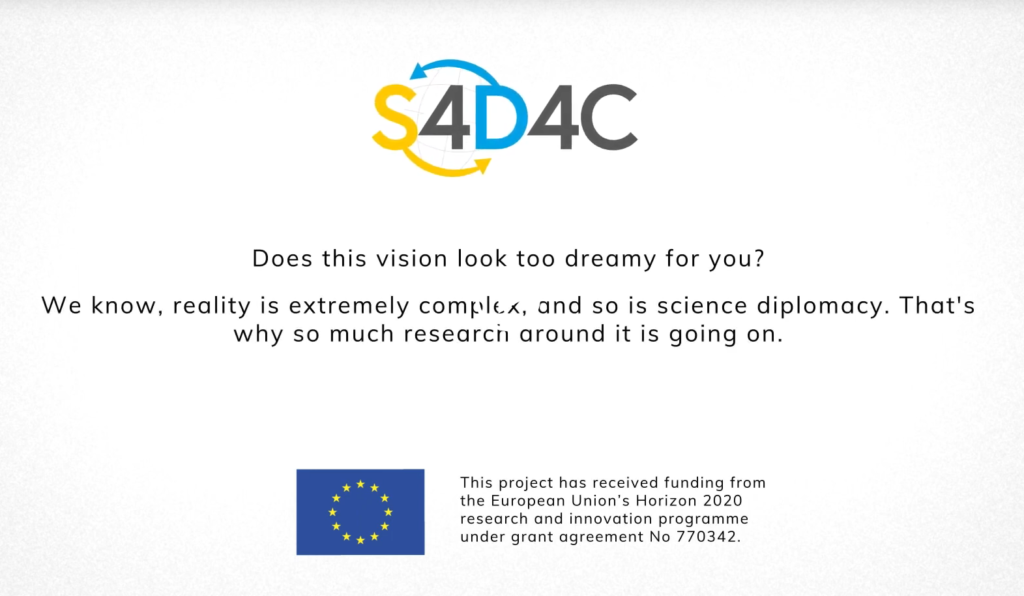
THE MADRID DECLARATION ON SCIENCE DIPLOMACY
PREAMBLE
Science diplomacy has long been a tool to develop bilateral and multilateral relationships. However, the definition and applications of science diplomacy have broadened considerably in recent years. This conceptual broadening coincides with the growing understanding that science and technology underpin so many of the challenges and opportunities that current societies face, whether as a driver or a potential solution. Integrating science into foreign policy to not only advance national interests but also to tackle shared global challenges is an appropriate response.
In this context, S4D4C organized the 1st Global Meeting on Science Diplomacy titled “EU Science Diplomacy beyond 2020” in Madrid in December 2018. At this event, experts from around the world discussed the present and future of science diplomacy, its fundamental role in addressing global challenges and the requirements to harness its full potential in the EU and beyond.
As a result of these fruitful discussions this “Madrid Declaration on Science Diplomacy” was signed by a group of high-level experts who contributed to the conference. It proclaims a common vision of science diplomacy in the future, emphasizes the benefits science diplomacy can bring to tackling the global challenges of our time and outlines the principles needed to foster science diplomacy worldwide.
VISION
The “Madrid Declaration on Science Diplomacy” aims to foster agreement and raise awareness about the need to strengthen science diplomacy strategies and practices world-wide for the support of universal scientific and democratic values. These strategies are required to suitably include science and technology as key dimensions of foreign policy and international relationships at different political levels. This confluence of interests must be in the benefit of both the scientific endeavor as well as legitimate broader political and societal objectives.
Science diplomacy, in the context of this Declaration, is understood as a series of practices at the intersection of science, technology and foreign policy. The renewed interest in science diplomacy comes in response to identified challenges at the interface of science and foreign policy, where a greater scientific voice could both add value to bi- and multilateral discussions and decisions about our shared global concerns. Joint science diplomacy objectives are possible where actors converge around such common challenges. Therefore, science diplomacy goes beyond international science collaboration, as it tackles interests that go beyond the scientific ones and may directly or indirectly serve to advance diplomatic goals. The Madrid conference highlighted the growing importance of science diplomacy on a global level. One important role for science diplomacy, in this regard, is to build bridges between science, technology and innovation practices, national and regional interests, as well as global challenges.
We firmly believe that:
- Science diplomacy is often not fully exploited at all levels of governance, and especially at supranational levels;
- More explicit science diplomacy strategies at national and supranational levels would allow for a more effective alignment of interests and a more efficient coordination of resources.
BENEFITS OF SCIENCE DIPLOMACY
We firmly believe that the potential of science diplomacy is yet to be fully realized. It includes:
- Endeavors to address global challenges.Science and technology are global enterprises. Together with other tools in diplomacy, science diplomacy can facilitate the identification of common global challenges. Coordinated scientific efforts can help to address these global challenges. The relationship between global challenges and scientific practices goes both ways. Efforts to achieve the “Sustainable Development Goals” are an example of how global challenge-related policy-making and scientific research must be in constant dialogue.
- More productive and sustainable international relationsat multilateral and bilateral levels owing their interaction with science and technology. The precondition for this is that scientific activities are considered but not appropriated by broader political rationales.
- Evidence-informed foreign policy supported by science and technology, aiming at substantive and resilient international agreements, treaties and policies.
- Better conditions for scientific activities due to the contribution of foreign policy agendas. Diplomacy, with the support of the scientific community, has a particular role to play in the implementation of larger scientific initiatives and projects (e.g. research infrastructures, joint programmes, etc.).
- Improved interfaces between science and public policies. Science diplomacy can contribute to eliminating cultural, sectoral, and knowledge barriers between different actors such as policy-makers, researchers, diplomatic bodies and civil society.
PRINCIPLES TO FOSTER SCIENCE DIPLOMACY WORLDWIDE
- Value for citizens:governments, diplomats and researchers are encouraged to acknowledge and demonstrate science diplomacy as a fundamental and universal tool to improve international relations in general.
- Methodological diversity: consider explicit and implicit types of science diplomacy objectives. This involves acknowledging that not all relevant science diplomacy practices are labelled as such. Putting the science diplomacy label on a given project, programme or policy is a strategic choice.
- Demonstrable impact:the potential positive effects of science diplomacy need to be measured and recognized. At the same time, there may be unintended side effects that need to be acknowledged and assessed. Public policies not relating to science diplomacy may also have unintended effects in the realm of science diplomacy.
- Evidence-informed: in foreign affairs-related policies in relevant areas. This knowledge can be content-related (e.g. scientific evidence on climate change, global inequality, cyber security), context-related (e.g. knowledge about a specific innovation system) or process-related (e.g. evaluative knowledge on the effects and the outcome of science diplomacy interventions).
- Collaboration and inclusion: science diplomacy is a multi-actor effort in which diplomats, scientists and science managers as well as other non- state actors can have a role and can contribute to its deployment. This applies at the local, regional, national and international level. This innovative model brings new governance and coordination mechanisms that need to be managed in dialogue with all stakeholders.
- Capacity building:All stakeholders involved in science diplomacy will benefit from exchange and suitable capacity building activities. Therefore, cutting-edge, interdisciplinary, intergenerational, interactive training modules are needed. These will enable diplomats, public officials and scientists to cooperate in an efficient way, strengthening future science diplomacy. This capacity building runs in parallel to the need to establish new science diplomacy positions such as science advisors in foreign ministries, scientific staff at Embassies, etc., which will also foster new career paths for science diplomacy professionals.
- Independence of science: science is an extremely useful tool for addressing global challenges and for improving international relationships as long as it is not distorted by ideological goals
The declaration is intending a truly global reach. If you would like to sign it as well, just send your name, affiliation and motivation to sign to s4d4c@fecyt.es!
The Madrid Declaration as pdf: Download
People:
|
SIGNATORIES OF THE DECLARATION BY ALPAHBETICAL ORDER Note: The experts promoting this Declaration are signing on an individual basis. Their signature does not mean endorsement by any institution. |
||
|
Name |
Surname |
Position |
|
Reham |
Abo-Shnaf |
Researcher, Plant Protection Research Institute (PPRI), Egypt |
|
Muhammad |
Adeel |
Career Diplomat, Ministry of Foreign Affairs, Pakistan |
|
Yousuf |
Al Bulushi |
Head of Science, Knowledge and Technology Transfer Office (SKTT) Ministry of Foreign Affairs, Oman |
|
Katalin |
Alföldi |
Policy Officer and Grant Coordinator, European Cooperation in Science and Technology (COST) |
|
Khaled |
Alhazmi |
King Abdulaziz City for Science and Technology, Saudi Arabia |
|
Nelva |
Alvarado |
Researcher, University of Panama |
|
Orhan |
Alta |
Professor, Istanbul Technical University, Turkey |
|
Ana |
Anselmo |
International Matters, Helmholtz-Zentrum Berlin für Materialien und Energie, Germany |
|
Karina Elizabeth |
Aquino Valle |
Coordinator of Multilateral Cooperation, Ministry of Foreign Affairs and International Cooperation, Honduras |
|
Francisco Emilio |
Argote Vega |
Lecturer, Universidad Mariana, Pasto, Colombia; and Universidad Miguel Hernández, Alicante, Spain |
|
Cristina |
Arias-Navarro |
Scientific Programme Manager, French National Research Institute for Agriculture, Food and Environment (INRAE), France |
|
Ewert |
Aukes |
Post-doctoral Researcher, University of Twente, the Netherlands |
|
Chagun |
Basha |
Policy Fellow, DST’s Policy Research Centre, Indian Institute of Science (IISc), Bangalore, India |
|
Zukhra |
Bektepova |
Project Officer, Comprehensive Nuclear-Test-Ban Treaty Organization (CTBTO) |
|
Yoran |
Beldengrün |
Mercator Fellow on International Affairs 18/19 in Science Diplomacy |
|
Aranzazu |
Berbery-Alvarez |
Railway Engineering Researcher and Associated Professor, Technological University of Panama, Panama |
|
Sarah |
Beringer |
Head of Strategy & Communication, German Historical Institute Washington, USA |
|
Paul |
Berkman |
Director, Science Diplomacy Center, Tufts University, USA |
|
Mahantesh |
Biradar |
Postdoctoral Fellow, Institute of Biomedical Sciences, Academia Sinica, Taiwan |
|
Marta |
Božina Beroš |
Associate Professor, University of Pula, Croatia |
|
Philipp |
Brugner |
Project Manager, Centre for Social Innovation (ZSI), Austria |
|
Neha |
Bhutani |
Postdoctoral Researcher, Montreal Neurological Institute, McGill University, Canada |
|
Veronica |
Buccheri |
Senior Specialist, International Relations Service, National Institute of Nuclear Physics (INFN), Italy |
|
Melody B. |
Burkins |
Associate Director, John Sloan Dickey Center for International Understanding, Dartmouth College. Chair, US National Academies’ Board on International Scientific Organizations (BISO). Governing Board, International Science Council (ISC). Senior Fellow, UArctic Institute of Arctic Policy. Advisory Board, Science Diplomacy Division of International Network of Government Science Advisors (INGSA) |
|
Cecilia |
Cabello |
General Director, Spanish Foundation for Science and Technology (FECYT) |
|
Johana |
Cabrera |
Director, Science Connect, Chile |
|
Reina |
Camacho Toro |
Research Scientist, Laboratoire de Physique Nucléaire et de Hautes Energies (LPNHE/CNRS), ATLAS experiment at CERN, France |
|
Montaña |
Cámara |
Professor in Food Science and Nutrition, Faculty of Pharmacy, University Complutense of Madrid, Spain |
|
Franklin |
Carrero-Martínez |
Board Director, National Academy of Sciences, USA |
|
Isabel |
Carrilero |
Associate Director, Industry Association of Navarra, Spain |
|
María Esmeralda |
Castelló Gómez |
Associate Professor of Research, Instituto de Investigaciones Biológicas Clemente Estable, Ministry of Education and Culture, Uruguay |
|
Sara |
Cebrián |
Science and Innovation Attaché, UK-Science and Innovation Network (SIN-UK), British Embassy in Madrid |
|
Siti Khodijah |
Chaerun |
Professor, Faculty of Mining and Petroleum Engineering, Institut Teknologi Bandung, Indonesia |
|
Tatjana |
Christelbauer |
President, Agency for Cultural Diplomacy (ACD), Austria |
|
William |
Colglazier |
Senior Scholar, Center for Science Diplomacy, American Association for the Advancement of Science (AAAS), USA |
|
Pedro |
Cortegoso |
Education Attaché, Spanish Embassy in Brazil |
|
Marie |
Croce |
Former Junior Researcher, Centre for Social Innovation (ZSI), Austria |
|
Kerstin |
Cuhls |
Scientific Project Manager, Fraunhofer Institute for Systems and Innovation Research ISI, Germany |
|
Elke |
Dall |
Senior Researcher, Centre for Social Innovation (ZSI), Austria |
|
Alexander |
Degelsegger-Márquez |
Head of Digital Health and Innovation, Austrian Public Health Institute, Austria |
|
Estrella |
Díaz Sánchez |
Distinguished Researcher and Marie Skłodowska-Curie Fellow, University of Castilla-La Mancha, Spain |
|
Wolfgang |
Eberhardt |
Deutsches Elektronen-Synchrotron DESY, Delegate of Germany to the Council of SESAME |
|
Christoph S. |
Eberle |
Biochemist, Boston, MA, USA |
|
Luisa |
Echeverría |
Internationalisation Advisor, Servicio Nacional de Aprendizaje (SENA), Colombia |
|
Ana |
Elorza |
Science Advice Coordinator, Spanish Foundation for Science and Technology (FECYT) |
|
Javier |
Escudero |
President, Society of Spanish Researchers in the United Kingdom, UK |
|
Omololu |
Fawunga |
Researcher, University of Huddersfield, UK |
|
Pedro |
Figueroa |
Coordinator, National Agency for Research and Development (ANID), Chile |
|
Andrew |
Fenemor |
Senior Scientist Integrated Catchment Management, Manaaki Whenua Landcare Research, New Zealand |
|
Tim |
Flink |
Post-doctoral Researcher and Lecturer, Humboldt University of Berlin, Germany |
|
Cristina |
Fraile |
Deputy Head of Mission, Spanish Embassy in the US |
|
Wiebke |
Frey |
Researcher, Leibniz Institute for Tropospheric Research (TROPOS), Leipzig, Germany |
|
Laura |
García Ibáñez |
Specialist in Immunology, Cancer and Health Policy, Brussels, Belgium |
|
Silvia Herminia |
García Martínez |
Auditor, Instituto de Fomento Municipal, Guatemala |
|
Miguel |
García-Herráiz Roobaert |
Former Deputy Secretary General, Union for the Mediterranean (UfM), Spain |
|
Kemel Ahmed |
Ghotme |
Director of Translational Neuroscience Research Lab, Universidad de la Sabana, Colombia |
|
Rolando A. |
Gittens |
Researcher, Instituto de Investigaciones Científicas y Servicios de Alta Tecnología (INDICASAT AIP), Panamá |
|
Peter |
Gluckman |
Chair, International Network for Government Science Advice, New Zealand |
|
Didier |
Goosens |
Head of Corporate Communication, Fonds National de la Recherche, Luxembourg |
|
Robin |
Grimes |
Professor, Imperial College London. Former Chief Science Adviser, Foreign and Commonwealth Office (FCO) of the United Kingdom, UK |
|
Nicole |
Grobert |
Chief Scientific Advisor, Science Advice Mechanism, European Commission |
|
Marga |
Gual Soler |
International Science Diplomacy Advisor, Member of the Research, Innovation, and Science Experts (RISE) High-Level Group to European Commissioner Carlos Moedas, Spain |
|
Adrián |
Gutiérrez |
Science & Technology Counsellor, CDTI representative, Spanish Embassy in New Delhi, India |
|
Claudia |
Guerrero |
Director of International Cooperation, Panama |
|
Jürgen |
Haberleithner |
Professor and Researcher, Universidad de Colima, Mexico |
|
Martina |
Hartl |
Deputy Head of Department, Department of International Research Cooperation and Science Diplomacy, Federal Ministry for Education, Science and Research, Austria |
|
John R. |
Helliwell |
Emeritus Professor of Chemistry, University of Manchester, UK |
|
Ralf |
Hermann |
Head, German Office for International Cooperation in Vocational Education and Training (GOVET) |
|
Alma Cristal |
Hernández-Mondragón |
Director, Science, Centers and Transfer of Knowledge, SECTEI, México City Government |
|
Mirabbos |
Hojamberdiev |
Research Professor, Department of Natural and Mathematic Sciences, Turin Polytechnic University, Uzbekistan |
|
Viktoria |
Holler |
Project Manager, IÖB-Servicestelle, Austria |
|
Maximilian |
Huck |
Project Manager, Diplomatische Akademie Wien, Austria |
|
Niccolò |
Iorno |
Science Officer, Swiss Federal Department of Foreign Affairs, Switzerland |
|
Borja |
Izquierdo |
Director, International Science Department Director, Spanish Foundation for Science and Technology (FECYT) |
|
Agnieszka |
Jarzewicz |
Independent Expert for the European Commission |
|
Maria |
Josten |
Senior Scientific Officer, German Aerospace Center / Project Management Agency (DLR) |
|
Cyrus |
Kamau Kihuha |
Chief Analyst; Infrastructure, Information and Communication Services; National Commission for Science, Technology and Innovation, Republic of Kenya |
|
Malvina |
Karaj |
Technical Director of Pharmacy, Albania |
|
Victoria |
Kayser-Cuny |
International Expert in Education, USA |
|
Dirk-Jan |
Koch |
Chief Science Officer, Ministry of Foreign Affairs, The Netherlands |
|
Jacek Łukasz |
Kolanowski |
Principal Investigator, Institute of Bioorganic Chemistry PAS in Poznan, and Vice-Chair-Elect, Polish Young Academy, Poland |
|
Thomas |
König |
Head of Strategy and Scientific Services, Institute for Advanced Studies Vienna, Austria |
|
Andriy |
Kozka |
Vice-President of International of Public Diplomacy Mission, Ukraine |
|
R. Andreas |
Kraemer |
Founder, Ecologic Institute, European Union |
|
Olga |
Krasnyak |
Lecturer in International Studies, Underwood International College, Yonsei University, Korea |
|
Radenka |
Krsmanović Whiffen |
Marie Sklodowska-Curie Individual Fellow, ENEA Casaccia Research Centre, Rome, Italy |
|
Elisabeth |
Kubin |
Postdoctoral Researcher in Physical and Biological Oceanography, National Institute of Oceanography and Applied Geophysics (OGS), Italy |
|
Stefan |
Kuhlmann |
Professor, University of Twente, the Netherlands |
|
Léonard |
Laborie |
Researcher, CNRS, Deputy Coordinator of the Horizon 2020 project “Inventing a shared science diplomacy for Europe” (InsSciDE), France |
|
Luis Miguel |
Lacerda |
President, Portuguese Association of Researchers and Students in the UK, UK |
|
Izaskun |
Lacunza |
Head of Unit, Spanish Foundation for Science and Technology (FECYT) |
|
Lorena |
Lamas |
PhD in International Relations, Researcher of International Cooperation for Sustainable Development, Uruguay |
|
Angela |
Liberatore |
Head of Unit Social Sciences and Humanities, European Research Council Executive Agency |
|
David |
Mandelweit |
Researcher, Universidad Complutense de Madrid, Spain |
|
Júlia |
Mascarello |
Master Student, Federal University of Santa Catarina, Brazil |
|
Katja |
Mayer |
Scientific Project Manager, Centre for Social Innovation (ZSI), Austria |
|
Claire |
Mays |
Executive Director, Horizon 2020 project “Inventing a shared science diplomacy for Europe” (InsSciDE), France |
|
Peter |
McGrath |
Coordinator, Science Policy/Science Diplomacy Programme, The World Academy of Sciences (TWAS), Italy |
|
Lorenzo |
Melchor |
EU Science Advice and Diplomacy Officer, Spanish Foundation for Science and Technology (FECYT) |
|
Margoth |
Mena Young |
Researcher, Universidad de Costa Rica, Costa Rica |
|
Nadia |
Meyer |
Senior Scientific Officer, German Aerospace Center / Project Management Agency (DLR) |
|
Alexandra |
Middleton |
Assistant Professor, University of Oulu, Finland |
|
James |
Moran |
Ambassador, Associate Senior Fellow, Centre for European Policy Studies, Belgium |
|
Pier Francesco |
Moretti |
Consiglio Nazionale delle Ricerche (CNR), Italy |
|
Maria Ángela Lorena |
Mosquera Montoya |
International Relations Adviser, Colombian National Police |
|
Felix |
Moronta-Barrios |
Programme Specialist, ICGEB Biosafety, Full Member of the Global Young Academy, Vice-Director of Persea Foundation. |
|
Jan Marco |
Müller |
Head of Directorate Office, Coordinator for Science to Policy and Science Diplomacy, International Institute for Applied Systems Analysis (IIASA), Austria |
|
Dicky |
Muslim |
Associate Professor, Universitas Padjadjaran (UNPAD), Indonesia |
|
Bashirullah |
Najimi |
Transform Fund Specialist, The Islamic Development Bank (IsDB), Division of Science, Technology and Innovation (IDB-STI), Saudi Arabia |
|
Suryesh K |
Namdeo |
Programme Officer, DST Centre for Policy Research, Indian Institute of Science (IISc), Bangalore, India |
|
Ababacar Sadick |
Ndoye |
Chairman, Partner Relations Commission, Académie Nationale des Sciences et Techniques du Sénégal |
|
Mona |
Nemer |
Chief Scientific Advisor to Canada´s Prime Minister, Canada |
|
Eduardo |
Oliver |
Secretary-General, Network of Associations of Spanish Researchers and Scientists Abroad (RAICEX), Spain |
|
Miguel |
Oliveros |
Cultural and Scientific Diplomatic Counselor, Spanish Embassy in London |
|
Gonzalo |
Ordoñez Matamoros |
Assistant Professor, University of Twente, the Netherlands |
|
Farah |
Ouechtati |
Researcher and Lecturer, Sorbonne University, France |
|
Miriam |
Palacios-Callender |
Visiting Researcher, Global Health and Social Medicine, King’s College London, UK |
|
Florencia |
Paoloni |
Science and Technology Secretary, Italian – Latin America International Organization (IILA), Roma, Italy |
|
Danev Ricardo |
Pérez Valeriano |
Head of International Relations, Instituto Finlay de Vacunas, Cuba |
|
Marinella |
Perosa |
Trieste, Italy |
|
Minh-Hà |
Pham |
Vice President for International Relations, Université PSL, France |
|
Steven |
Phipps |
Senior Research Fellow, University of Tasmania, Australia |
|
Sergiu |
Porcescu |
Founder, Knowledge HUB Moldova |
|
Carlos |
Quintana |
National Manager for China and Russia, Centre for the Development of Industrial Technology (CDTI), Spain |
|
Rémi |
Quirion |
Chief Scientist of Québec, Gouvernment du Québec, Canada |
|
Alexander |
Raer |
PhD Candidate, University of Tübingen, Germany |
|
Moaz ur |
Rahman |
Principal Scientist, National Institute for Biotechnology and Genetic Engineering (NIBGE), Pakistan |
|
Pauline |
Ravinet |
Assistant Professor, University of Lille, France |
|
Jonas |
Reiche-Weiland |
Academic Coordinator, Arab-German Young Academy, Germany |
|
Margarida |
Ribeiro |
Policy Officer, DG Research and Innovation, European Commission |
|
Gilda Maria |
Rodrigues Lopes |
Researcher, Centre for Marine and Environmental Research (CIMA), University of Algarve, Portugal |
|
Alexis |
Roig |
CEO, SciTech DiploHub – the Barcelona Science and Technology Diplomacy Hub, Spain |
|
Marco |
Rondón Robles |
Biologist, Servicio Nacional de Áreas Naturales Protegidas (SERNANP), Perú |
|
Raquel |
Saiz |
Director of Strategy and Analysis, Asociación Española de Bioempresas (ASEBIO), Spain |
|
Daniel |
Santos |
Head of Department of Physics, University of Oviedo, Spain |
|
Gulsen |
Saray |
Lecturer, HBVU University, Turkey |
|
Wagdy |
Sawahel |
Research Professor, National Research Centre (NRC), Egypt |
|
Zehra |
Sayers |
Professor, Faculty of Engineering and Natural Sciences, Sabancı University, Turkey |
|
Klaus |
Schuch |
Scientific Director, Centre for Social Innovation (ZSI), Austria |
|
Seyed |
Shahmy |
Senior Scientist, National Science and Technology Commission, Sri Lanka |
|
Mostafa Moonir |
Shawrav |
Vice-Chair, Marie Curie Alumni Association (MCAA) |
|
Fernando |
Simón |
Director, Spanish Coordinating Centre for Health Alerts and Emergencies |
|
Paramdeep |
Singh |
Associate Professor, Baba Farid University of Health Sciences, India |
|
Daniëlla |
Smit |
Project Officer in Maritime Safety and Security and Disaster Risk Management, Indian Ocean Rim Association (IORA) Secretariat, Mauritius |
|
Anna |
Soliguer Guix |
PhD Student, Information and Knowledge Society, Open University of Catalunya (UOC), Spain |
|
Grigore |
Stamatescu |
Associate Professor, Department of Automation and Industrial Informatics, University “Politehnica” of Bucharest, Romania |
|
Verónica |
Suárez |
Head of Institutional Relations, Agencia Uruguaya de Cooperación Internacional, Presidencia de la República Oriental del Uruguay |
|
Abdel Nasser |
Tawfik |
Professor of Physics, Nile University (NU), Egypt |
|
Chaibi M. |
Thameur |
Director of Research, Institut National de Recherche en Génie Rural Eaux et Forêts (INRGREF), Tunisia |
|
Francesca |
Tolve |
Office for European and International Relations, National Research Council of Italy (CNR), Italy |
|
Ramón |
Torrent |
President of OBREAL, Coordinator of EULAC Focus |
|
Mario |
Torres |
Director, European Institute of International Studies, Sweden |
|
Ivonne |
Torres-Atencio |
Director, Department of Pharmacology, Faculty of Medicine, University of Panama, Panama |
|
Moctar |
Touré |
Vice-President, The World Academy of Sciences (TWAS), Italy |
|
Riccardo |
Trobbiani |
Project Researcher, United Nations University Institute on Comparative Regional Integration Studies (UNU-CRIS), Belgium |
|
Luk |
Van Langenhove |
, Horizon 2020 Project “European Leadership for Cultural, Science and Innovation Diplomacy” (EL-CSID), Belgium |
|
Peter |
Vangsbo |
Executive Director, Innovation Center Denmark, Danish Embassy to Korea |
|
David |
Velázquez |
Communication Officer, EU Polar-net, Alfred-Wegener-Institute, Germany |
|
Yoan Israel |
Viamonte Garrido |
SciTechIntel Consulting Services, Ecuador |
|
Petrica |
Vizureanu |
Director, Department of Technologies and Equipment for Materials Processing, Faculty of Materials Sciences & Engineering, Gheorghe Asachi Technical University of Iasi, Romania |
|
Alexandra |
Vorobiova Belova |
Predoctoral Researcher, Department of Historical Sciences and Musicology, Milá y Fontanals Institute, The Spanish National Research Council (CSIC) |
|
Kaustubh R. |
Wadekar |
i-M Tech Student & NPTEL-SWAYAM Coordinator, Institute of Chemical Technology (ICT) Mumbai – IndianOil Odisha Campus (IOC) Bhubaneswar, India |
|
Tom |
Wang |
Former Director, Centre for Science Diplomacy, American Association for the Advancement of Science (AAAS), USA |
|
Claudia Natalie |
Widmaier Müller |
Foreign Trade Technician, Uruguayan National Customs |
|
Akadiri |
Yessoufou |
Associate Professor, University of Abomey-Calavi, Benin |
|
Mitchell |
Young |
Assistant Professor, Charles University, Czech Republic |
|
Lassina |
Zerbo |
Executive Secretary, Comprehensive Nuclear-Test-Ban Treaty Organization (CTBTO) |





